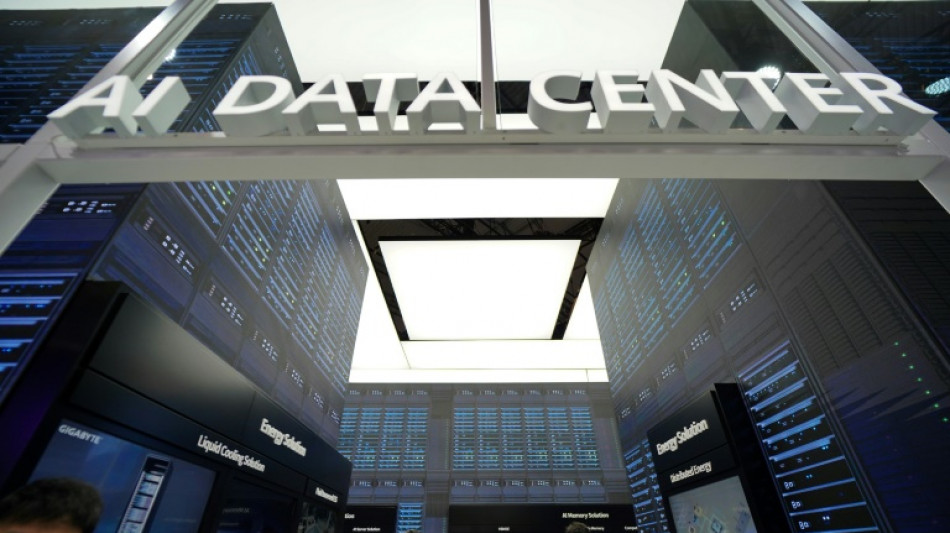
-
 Japan seeks to ramp up Asian Games buzz with year to go
Japan seeks to ramp up Asian Games buzz with year to go
-
Judge weighs court's powers in Trump climate case

-
 Australian scientists grapple with 'despicable' butterfly heist
Australian scientists grapple with 'despicable' butterfly heist
-
US faces pressure in UN Security Council vote on Gaza

-
 As media declines, gory Kirk video spreads on 'unrestrained' social sites
As media declines, gory Kirk video spreads on 'unrestrained' social sites
-
'I don't cry anymore': In US jail, Russian dissidents fear deportation

-
 Jimmy Kimmel show off air 'indefinitely' after his Kirk comments
Jimmy Kimmel show off air 'indefinitely' after his Kirk comments
-
Meta expands AI glasses line in a bet on the future

-
 Trump's UK state visit gets political after royal welcome
Trump's UK state visit gets political after royal welcome
-
Pope Leo puts the brake on Church reforms
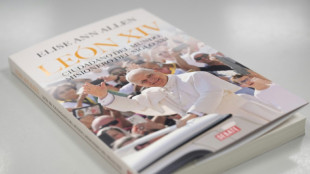
-
 ABC says Jimmy Kimmel off air 'indefinitely' after Charlie Kirk comments
ABC says Jimmy Kimmel off air 'indefinitely' after Charlie Kirk comments
-
Tourists return to Peru's Machu Picchu after community protest

-
 Simeone calls for more protection after Liverpool scuffle
Simeone calls for more protection after Liverpool scuffle
-
Trump gets lavish UK banquet - and an awkward guest

-
 Colombia's Restrepo aims to make history as World Athletics head
Colombia's Restrepo aims to make history as World Athletics head
-
US stocks finish mixed as Fed cuts rates for first time in 2025

-
 Palmer blames 'lack of concentration' for Bayern defeat
Palmer blames 'lack of concentration' for Bayern defeat
-
12-million-year-old porpoise fossil found in Peru
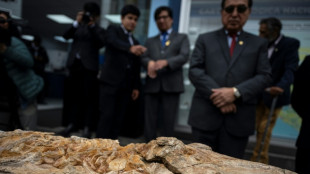
-
 Van Dijk grabs Liverpool win, PSG start Champions League defence in style
Van Dijk grabs Liverpool win, PSG start Champions League defence in style
-
Kane doubles up as Bayern sink Chelsea in Champions League

-
 Van Dijk snatches Champions League win for Liverpool as Simeone sees red
Van Dijk snatches Champions League win for Liverpool as Simeone sees red
-
Cardi B expecting child with football player boyfriend Diggs

-
 Kvaratskhelia stunner helps holders PSG to winning Champions League start
Kvaratskhelia stunner helps holders PSG to winning Champions League start
-
Thuram on target as Inter Milan cruise at Ajax

-
 Chimps ingest alcohol daily: study
Chimps ingest alcohol daily: study
-
With eye on US threat, Venezuela holds Caribbean military exercises

-
 Only 40% of countries have booked lodging for Amazon climate meet
Only 40% of countries have booked lodging for Amazon climate meet
-
Louboutin taps Jaden Smith to lead well-heeled shoemaker's men's line

-
 Pakistan beat UAE to set up India rematch in Asia Cup
Pakistan beat UAE to set up India rematch in Asia Cup
-
US Fed makes first rate cut of 2025 over employment risks

-
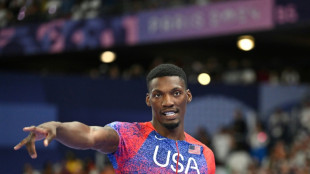 US sprint star Kerley joins drug-fueled Enhanced Games
US sprint star Kerley joins drug-fueled Enhanced Games
-
Decaying body found in US rapper's Tesla identified as teen girl

-
 Flick backs 'unbelievable' Rashford to shine in Yamal absence
Flick backs 'unbelievable' Rashford to shine in Yamal absence
-
Mourinho poised for Benfica return after Lage sacking

-
 Brazil's Bolsonaro adds skin cancer to medical woes
Brazil's Bolsonaro adds skin cancer to medical woes
-
Colombia vows to fight drug trade 'with or without' the US

-
 Germany's Merz criticises festival for axing Israeli conductor
Germany's Merz criticises festival for axing Israeli conductor
-
Thousands protest in London over Trump UK visit

-
 Fired US health agency chief testifies on pressure to 'replace evidence with ideology'
Fired US health agency chief testifies on pressure to 'replace evidence with ideology'
-
Palestinians flee Gaza City in face of deadly Israeli offensive

-
 England take Salt path to victory over Ireland in first T20
England take Salt path to victory over Ireland in first T20
-
French strikes hit Bayeux Tapestry transfer ahead of UK loan

-
 New York officials sink Times Square casino bid
New York officials sink Times Square casino bid
-
Canada central bank cuts key lending rate citing Trump tariffs

-
 Pakistan Asia Cup match belatedly goes ahead amid India handshake row
Pakistan Asia Cup match belatedly goes ahead amid India handshake row
-
Nader pulls off shock in 1,500 metres, Moon rises to pole vault challenge at worlds

-
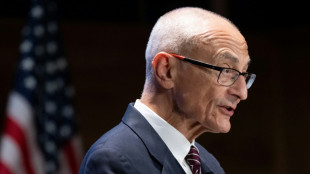 Ex-US climate envoy: Trump threatening 'consensus science' worldwide
Ex-US climate envoy: Trump threatening 'consensus science' worldwide
-
EU proposes action on Israel trade and ministers over Gaza

-
 US Treasury official expected to be named IMF's second-in-command: source
US Treasury official expected to be named IMF's second-in-command: source
-
Man City 'apparently' not Champions League contenders: Guardiola


Tech giants scramble to meet AI's looming energy crisis
The artificial intelligence industry is scrambling to reduce its massive energy consumption through better cooling systems, more efficient computer chips, and smarter programming -- all while AI usage explodes worldwide.
AI depends entirely on data centers, which could consume three percent of the world's electricity by 2030, according to the International Energy Agency. That's double what they use today.
Experts at McKinsey, a US consulting firm, describe a race to build enough data centers to keep up with AI's rapid growth, while warning that the world is heading toward an electricity shortage.
"There are several ways of solving the problem," explained Mosharaf Chowdhury, a University of Michigan professor of computer science.
Companies can either build more energy supply -- which takes time and the AI giants are already scouring the globe to do -- or figure out how to consume less energy for the same computing power.
Chowdhury believes the challenge can be met with "clever" solutions at every level, from the physical hardware to the AI software itself.
For example, his lab has developed algorithms that calculate exactly how much electricity each AI chip needs, reducing energy use by 20-30 percent.
- 'Clever' solutions -
Twenty years ago, operating a data center -- encompassing cooling systems and other infrastructure -- required as much energy as running the servers themselves.
Today, operations use just 10 percent of what the servers consume, says Gareth Williams from consulting firm Arup.
This is largely through this focus on energy efficiency.
Many data centers now use AI-powered sensors to control temperature in specific zones rather than cooling entire buildings uniformly.
This allows them to optimize water and electricity use in real-time, according to McKinsey's Pankaj Sachdeva.
For many, the game-changer will be liquid cooling, which replaces the roar of energy-hungry air conditioners with a coolant that circulates directly through the servers.
"All the big players are looking at it," Williams said.
This matters because modern AI chips from companies like Nvidia consume 100 times more power than servers did two decades ago.
Amazon's world-leading cloud computing business, AWS, last week said it had developed its own liquid method to cool down Nvidia GPUs in its servers - - avoiding have to rebuild existing data centers.
"There simply wouldn't be enough liquid-cooling capacity to support our scale," Dave Brown, vice president of compute and machine learning services at AWS, said in a YouTube video.
- US vs China -
For McKinsey's Sachdeva, a reassuring factor is that each new generation of computer chips is more energy-efficient than the last.
Research by Purdue University's Yi Ding has shown that AI chips can last longer without losing performance.
"But it's hard to convince semiconductor companies to make less money" by encouraging customers to keep using the same equipment longer, Ding added.
Yet even if more efficiency in chips and energy consumption is likely to make AI cheaper, it won't reduce total energy consumption.
"Energy consumption will keep rising," Ding predicted, despite all efforts to limit it. "But maybe not as quickly."
In the United States, energy is now seen as key to keeping the country's competitive edge over China in AI.
In January, Chinese startup DeepSeek unveiled an AI model that performed as well as top US systems despite using less powerful chips -- and by extension, less energy.
DeepSeek's engineers achieved this by programming their GPUs more precisely and skipping an energy-intensive training step that was previously considered essential.
China is also feared to be leagues ahead of the US in available energy sources, including from renewables and nuclear.
G.Schmid--VB
